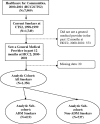Primary care providers advising smokers to quit: comparing effectiveness between those with and without alcohol, drug, or mental disorders
- PMID: 21859810
- PMCID: PMC3254155
- DOI: 10.1093/ntr/ntr167
Primary care providers advising smokers to quit: comparing effectiveness between those with and without alcohol, drug, or mental disorders
Abstract
Introduction: Individuals with alcohol, drug, or mental (ADM) disorders combined make up over 40% of all smokers in the U.S. Primary care providers (PCPs) play an important role in smoking cessation counseling, but their effectiveness with this population is unclear. This study evaluated the effectiveness of PCP smoking cessation counseling for smokers with ADM disorders.
Methods: Probit regressions conducted in 2009-2010 examined the relationship between past year PCP smoking cessation counseling and successful quitting among 1,356 adults who reported smoking in the 1998-1999 Community Tracking Study survey and who reported seeing a PCP in the past year in the follow-up 2000-2001 Healthcare for Communities Survey. Past year PCP exercise counseling was used as an instrumental variable for past year PCP smoking cessation counseling to account for potential hidden bias between smoking status and receipt of smoking cessation counseling.
Results: Smokers with and without ADM disorders were equally likely to receive smoking cessation counseling (72.9% vs. 69.9%). Using the instrumental variable approach, smoking cessation counseling by PCPs was significantly associated (p < .01) with quitting among both groups. Predicted probabilities of quitting without smoking cessation counseling were 6.0% for smokers with ADM disorders and 10.5% for smokers without ADM disorders. Predicted probabilities of quitting with smoking cessation counseling were 31.3% for smokers with ADM disorders and 34.9% for smokers without ADM disorders.
Conclusions: This study shows that PCPs can help smokers with ADM disorders successfully quit. These smokers should be targeted for smoking cessation counseling to reduce the health burden of tobacco.
Figures

References
-
- Adhikari B, Kahende J, Malarcher A, Pechacek T, Tong V. Smoking-attributable mortality, years of potential life lost, and productivity losses—United States, 2000–2004. Morbidity and Mortality Weekly Report. 2008;57:1226–1228. doi:mm5745a3. - PubMed
-
- Breslau N. Psychiatric comorbidity of smoking and nicotine dependence. Behavior Genetics. 1995;25:95–101. doi:10.1007/BF02196920. - PubMed
-
- Burling AS, Burling TA. A comparison of self-report measures of nicotine dependence among male drug/alcohol-dependent cigarette smokers. Nicotine & Tobacco Research. 2003;5:625–633. doi:T4TK07BD0NVH8MG9. - PubMed
Publication types
MeSH terms
Grants and funding
LinkOut - more resources
Full Text Sources
Medical
Miscellaneous

